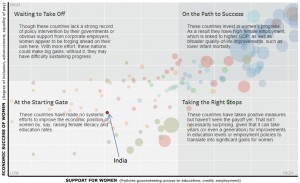The launch of the first all-women bank in India is a significant move by the current government (upcoming election considerations notwithstanding). Bharatiya Mahila Bank, India’s newest public sector bank, with a 1,000 crore initial budget under the Plan during 2013-14. According to an article on the bank’s site, the finance minister, P Chidambaram said:
“The idea is to empower women in the country and bring banking services at their doorstep. The bank will take initiatives to open accounts of women not only through branches but by organising camps all across the country,”
The women’s bank will support and coordinate with self-help groups and other organisations to promote lending to women. It will also tie up with existing state-run financial institutions to provide other services such as insurance and pension products.
In a recent interview with the Chair-woman of the bank, Usha Ananthasubramanian, said in response to the question, how will this bank be different from other banks?
We must appreciate the fact that women are underutilized as an economic asset and so there is a lot of untapped potential. We need to engage women economically. This bank’s approach will be to inspire people with entrepreneurial skills. We will tie up with NGOs. We will also locally mobilize women to train them in vocations like toy-making or driving tractors or mobile repairs. We will try to reach deeper rural pockets.
Ms. Ananthasubramanian echoes Angel Gurría, the secretary-general of the Organisation for Economic Co-operation and Development, in a 2013 April study published in the Harvard Business Review “Women are the most underutilized economic asset in the world’s economy”. The study place India firmly at the starting gate, where countries have made no systemic efforts to improve the economic position of women by, say, raising female literacy and education rates in the chart below.
The hopes and promises are high from the Bharatiya Mahila Bank (BMB), which is one of the very few all-women banks. Some others are: Mann Deshi Mahila Sahakari Bank (Mann Deshi Bank) in Maharashtra, Konoklota Women Urban Cooperative Bank in Assam, Shri Mahila SEWA Sahkari Bank Ltd in Ahmedabad. None of these other banks received as much fan fare as the BMB will receive in the coming months. The hopes however are just as greater of this new bank. These other smaller, self starter bank models have shown that women do benefit but taking it to scale to and making sure that its operations are truly centered on women – well only time will tell. The proof will be in the pudding, whether engaging women economically will mean economic empowerment for women or purely about getting to deeper rural pockets as Ms. Ananthasubraminam says.

